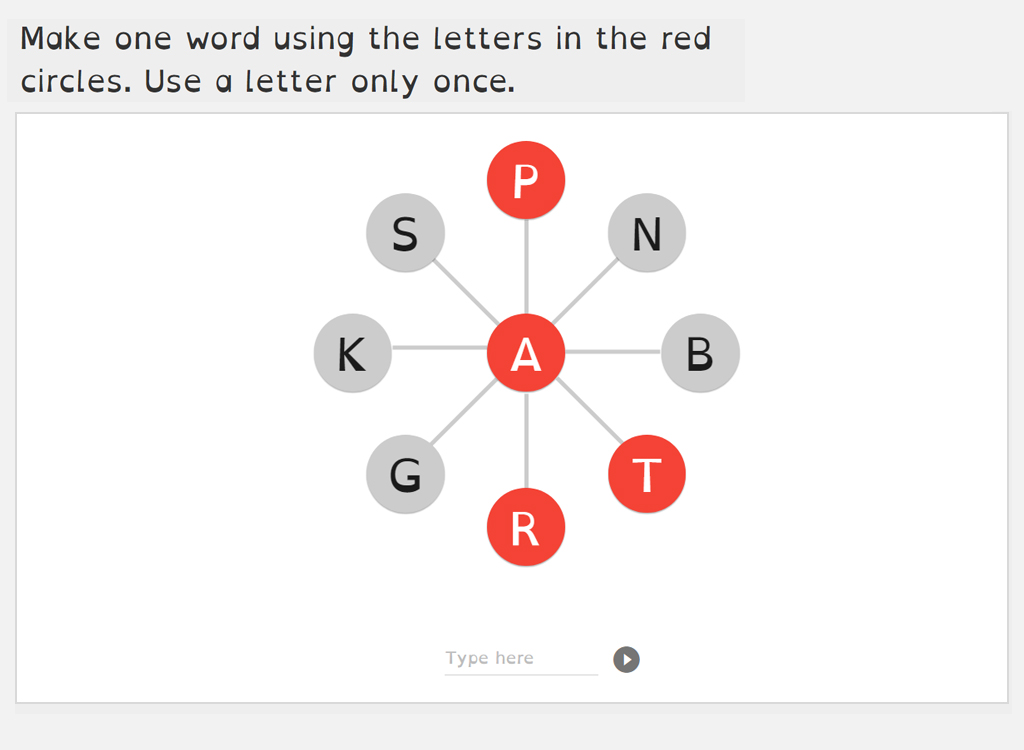Word Wheel Game
This activity is primarily meant for children who struggle to spell. The words are jumbled and the challenge is to unscramble these words. For those who spell well, the exercises act as word puzzles. Struggling spellers can listen to the audio and learn to spell the words.
This activity helps a struggling speller to learn the skill of identifying sounds made by each letter in a word.
How is the activity organised?
A set of eight letters are displayed in the shape of a circle. A vowel is at the centre. The jumbled letters are shown in red. The activity requires the user to unscramble the word by clicking the letter in the red coloured circles.
There are five levels in this activity. The stress is on the sounds vowels make. In level one, the vowel ‘a’ is at the centre. Level two has ‘e’ at the centre. Level three has ‘i’ at the centre and at the centre of level four is ‘o’. In the fifth level, ‘u’ is at the centre.
Tips for parents
One reason for the difficulty in spelling is the inability to hear the sound letters make. Some children though having normal hearing are unable to make out the sounds of letters. They may have Auditory processing Disorder (APD). To know more, go to the home page of this site and read notes under APD.
Observe how your child tackles the exercises in this activity. Find out whether your child is able to pick out the sounds of letters. Find out the types of words that are difficult for your child to spell. Take appropriate remedial actions.
For struggling spellers, dictation is a good remedial activity. Some children may require dictation several times a day.
Dictate words and passages.
When dictating words include words which your child knows how to spell well and mix few words which she/he cannot spell. When you dictate ten words, include at least six words which your child can spell well. Getting many answers right, boosts the child’s self confidence. The most important task while teaching a struggling speller is to give her/him a feeling of “I can do this.” Dictating only the words that the child cannot spell would demolish whatever confidence the child has.
Dictating passages is also a good remedial activity. Keep the activity short. Dictate a passage of about 150-200 words. Ask the child to do self-correction (proofreading) by comparing the text and what has been written. One must be aware of what mistakes one makes. Self awareness is an important learning tool. Proofreading is also good for improving concentration and it also makes children pay attention to details. Gently point out to your child the mistakes which she/he couldn’t spot. Dictating a passage daily would be helpful. Choose passages keeping in mind the level of your child. Gradually increase the level.
Make a note of the types of words your child is not comfortable with. These can be included in the dictation.
Writing fifteen sentences daily is a good activity for children who struggle to read and spell. These children may also have difficulty in putting thoughts to paper. Encourage them to keep a diary.
The internet offers plenty of useful material. YouTube has several videos meant for children to learn the sounds of letters.
Picture dictionaries are useful for struggling spellers. Search the net for picture dictionaries for children.
Spelling success- Graded Activities that Target Problems in Spelling by Peter Clutterbuck is an excellent book for struggling readers. This comes in five levels. Level one is especially useful because it explains the sound(s) each letter makes.

